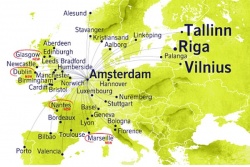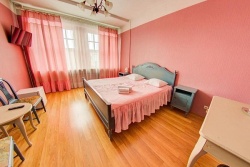Source: Baltictravelnews.com
According to Eurostat, the statistical office of the European Union, in 2009, nearly 1.5 billion nights were spent in hotels and similar establishments in the EU27, a decrease of 5.1% compared with 2008, after an annual change of –0.2% in 2008 and +3.5% in 2007. The largest decreases in EU were recorded in Latvia (-23.3%) and Lithuania (-20.4%).
The number of hotel nights spent by residents in their own country in 2009 fell by 1.6% and hotel nights spent by non-residents fell by 9.1%. The decline in the number of hotel nights in the EU27, which began in the middle of 2008, slowed down during 2009. The number of hotel nights fell at an annual rate of 8.0% in January-April 2009 (compared with the same period of the previous year), of 4.1% in May-August and of 3.6% in September-December.
Reklāma
Amongst the Member States, the highest numbers of nights spent in hotels in 2009 were recorded in Spain (251 million nights, –6.5% compared with 2008), Italy (238 mn, –4.3%), Germany (216 mn, –1.4%), France (191 mn, –5.6%) and the United Kingdom (170 mn, –1.7%). These five countries accounted for more than 70% of the total number of hotel nights in the EU27.
The number of nights spent in hotels in 2009 fell in all Member States, except Sweden (+0.1%). The largest decreases were recorded in Latvia (-23.3%), Lithuania (-20.4%), Cyprus (-19.7%) and Slovakia (-18.1%), and the smallest in Germany (-1.4%), the United Kingdom (-1.7%), Slovenia (-2.1%) and Austria (-2.9%).
In 2009, non-residents accounted for 44% of the total number of nights spent in hotels in the EU27 compared with 56% for residents. Apart from the two Mediterranean islands, Malta (96%) and Cyprus (89%), the highest proportions of non-residents were registered in Latvia (73%), Greece and Austria (both 72%).
To publish this article please contact BalticTravelnews.eu editorial board








